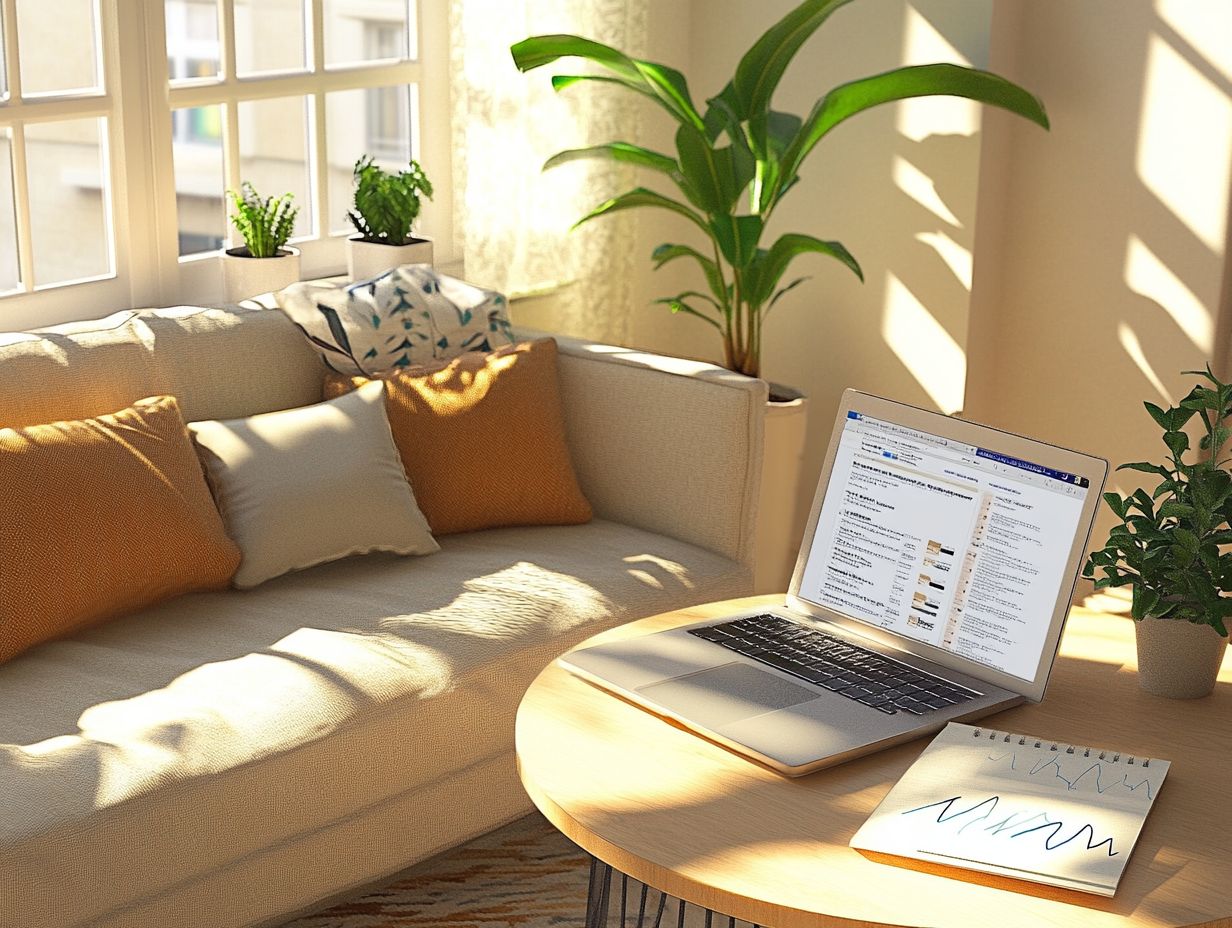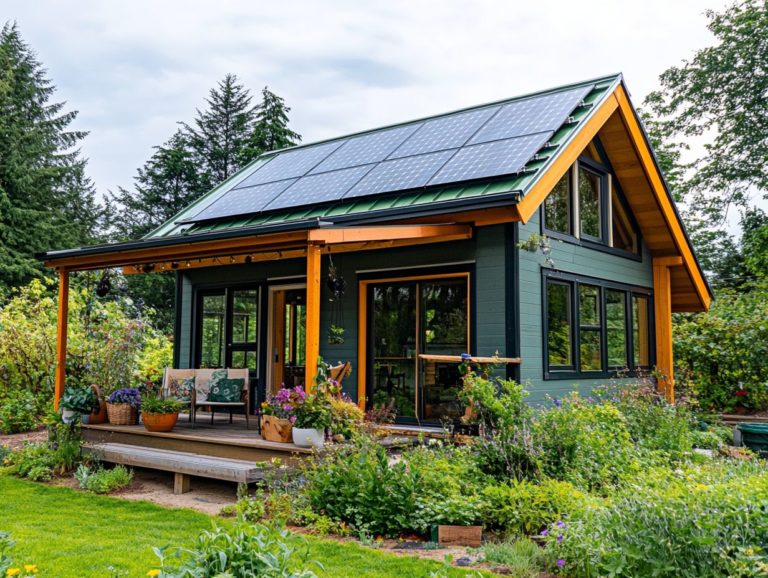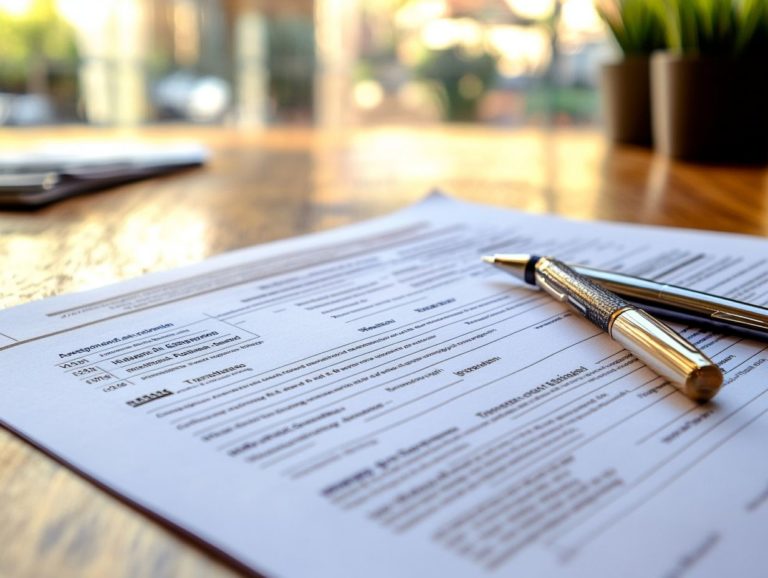5 Tips for Selecting Home Insurance Types
Choosing the right home insurance can seem like a daunting task, especially with the myriad of options at your fingertips. It s essential to grasp the different types of coverage available, knowing what s included and what isn t, to effectively safeguard your home and belongings.
Get ready to discover essential tips that will help you choose the best home insurance! You ll learn to consider the value of your assets, evaluate risk factors, and compare quotes like a pro. It also discusses the benefits of different policies, highlights common exclusions, and shares strategies for lowering your premiums.
Equip yourself with the knowledge necessary to make informed decisions and protect your home with confidence.
Contents
- Key Takeaways:
- 1. Explore Your Home Insurance Options
- 2. Understand What Is Covered and What Is Not
- 3. Consider the Value of Your Home and Possessions
- 4. Evaluate Your Risk Factors
- 5. Compare Quotes from Multiple Insurance Companies
- What Are the Benefits of Having Home Insurance?
- Frequently Asked Questions
- What factors should I consider when selecting home insurance types?
- How can I determine the appropriate coverage amount for my home insurance?
- What is the difference between actual cash value and replacement cost coverage?
- Is it necessary to have flood insurance?
- How often should I review and update my home insurance coverage?
Key Takeaways:

- Learn about the different types of home insurance.
- Know what is covered and excluded in your policy.
- Assess the value of your home and belongings to set coverage limits.
1. Explore Your Home Insurance Options
Understanding the various types of home insurance policies is essential for you as a homeowner. Each policy type, whether it’s HO-1, HO-2, HO-3, or specialized options like HO-4 for renters and HO-5 for comprehensive coverage, offers distinct levels of protection against risks such as fire, theft, and vandalism.
It’s vital to select the right insurance that aligns with your specific needs and circumstances.
- HO-1 is the basic option, covering only specific perils. It’s a good fit if you’re on a tight budget.
- Meanwhile, HO-2 broadens the coverage to include additional risks but still imposes limits on certain events.
- The ever-popular HO-3 provides extensive protection by covering all perils except those clearly excluded, which is why so many homeowners opt for it.
- On the other hand, HO-4 is designed for renters, safeguarding their personal belongings. HO-5 enhances that protection with even more comprehensive coverage, including replacement costs for personal property.
When you are choosing a policy, important factors like personal liability and adequate dwelling coverage play a crucial role in determining the level of financial protection and peace of mind you receive. Additionally, exploring ways to customize your home insurance policy can further enhance your coverage.
2. Understand What Is Covered and What Is Not
It’s vital for you to fully understand what your home insurance policy covers and what exclusions might apply. This knowledge directly influences your financial security and can significantly affect the claims process if property damage or personal liability incidents arise.
Familiarizing yourself with standard coverage options, such as dwelling coverage and personal liability coverage, is essential. Dwelling coverage protects your home’s structure from various risks, ensuring that damages whether from fire or vandalism can be repaired or rebuilt without financial strain.
Conversely, personal liability coverage shields you from claims of negligence, potentially saving you from costly legal battles. Be mindful of common exclusions like flood and earthquake damage, as these situations often require separate policies.
For example, if you encounter flooding caused by heavy rains, you may find yourself unprotected and financially burdened, highlighting the critical need for supplemental coverage in such scenarios.
3. Consider the Value of Your Home and Possessions
Considering the value of your home and possessions is crucial when determining the right insurance coverage. Understanding the difference between actual cash value and replacement cost options can greatly influence your insurance premiums and overall financial security.
Conducting a meticulous home inventory allows you to assess the true worth of your belongings. This provides you with a clear picture that helps in making informed decisions about your coverage levels.
This assessment is not only essential for obtaining accurate insurance quotes but also ensures that any future claims are well-supported. Keeping up with regular home maintenance can significantly impact both your premiums and coverage options.
Insurance providers often reward those who actively manage and protect their properties with lower rates. By taking a proactive approach in these areas, you can safeguard your investments and potentially save money over time.
Take the first step today to protect your home and peace of mind!
4. Evaluate Your Risk Factors

Evaluar tus factores de riesgo espec ficos, como la probabilidad de da os por inundaci n o terremoto en tu rea, es vital para personalizar tu p liza de seguro de hogar. Comprender c mo estos riesgos afectan tus primas te ayudar a tomar decisiones informadas.
La condici n de tu propiedad tambi n es importante. Las casas m s antiguas necesitan m s mantenimiento y protecci n contra problemas imprevistos.
Tu ubicaci n geogr fica juega un papel significativo. Las reas propensas a desastres naturales suelen enfrentar primas m s altas.
Las vulnerabilidades externas, como estar cerca de incendios forestales, tambi n pueden influir en tus evaluaciones. Comprender estos factores te permitir proteger mejor tu inversi n.
5. Compare Quotes from Multiple Insurance Companies
Comparar cotizaciones de varias compa as de seguros es esencial para encontrar las mejores opciones de cobertura. Diferentes proveedores ofrecen tarifas variadas, dependiendo de su evaluaci n de factores de riesgo.
Al obtener al menos tres cotizaciones, tendr s una comprensi n completa del mercado. Considera factores como los l mites de cobertura y los deducibles.
No olvides revisar las calificaciones del servicio al cliente. Estas pueden afectar tu experiencia durante las reclamaciones.
Negociar mejores tarifas puede llevar a ahorros sustanciales. Puedes hacerlo demostrando lealtad o presentando cotizaciones competitivas.
Revisar opiniones en l nea te dar valiosos conocimientos sobre la fiabilidad de los aseguradores y te ayudar a tomar decisiones informadas.
What Are the Benefits of Having Home Insurance?
Tener un seguro para propietarios ofrece muchos beneficios. Incluye protecci n contra da os, cobertura de responsabilidad personal y apoyo financiero para gastos adicionales durante reparaciones.
Una de las mayores ventajas es la tranquilidad de saber que tu inversi n est protegida. Esto incluye defensa contra desastres naturales, robos o reclamos de responsabilidad.
Pensando en un ejemplo, un propietario en California enfrent da os extensos por un incendio forestal. Gracias a su p liza, recibi fondos inmediatos para reconstruir.
Esta cobertura no solo ayuda a restaurar tu propiedad f sica; tambi n es crucial para asegurar pr stamos, ya que muchos prestamistas requieren prueba de seguro.
Invertir en seguros no se trata solo de protecci n; es una parte esencial de tu estrategia financiera global.
What Factors Affect the Cost of Home Insurance?
Varios factores influyen en el costo de tu seguro de hogar. Esto incluye el nivel de cobertura, los factores de riesgo de tu propiedad y las estrategias de precios de las compa as de seguros.
La ubicaci n de tu hogar es clave para determinar tus primas. Si vives en un rea propensa a desastres, como inundaciones o terremotos, espera tarifas m s altas.
La edad y el tipo de construcci n de tu propiedad tambi n son importantes. Las casas m s antiguas suelen requerir m s mantenimiento, lo que puede aumentar las primas.
Un historial de reclamaciones anteriores puede indicar riesgo, elevando tus costos. Considera invertir en medidas preventivas como:
- Regular mantenimiento
- Actualizar caracter sticas de seguridad
- Buscar tarifas competitivas
Tomando estos pasos, puedes asegurar la mejor cobertura sin gastar de m s.
What Are the Common Exclusions in Home Insurance Policies?

Common exclusions in home insurance policies can significantly impact your financial protection. Many policies do not cover natural disasters such as floods or earthquakes, along with specific incidents like fire, theft, and vandalism.
Liability coverage can also be limited in scenarios like dog bites or injuries occurring on rental properties. This limitation can leave you in a vulnerable position.
To navigate these limitations, it’s wise to explore additional options. You can add extra coverage options, known as endorsements, to your existing policy for those excluded events, such as flooding or earthquakes. Consider getting separate policies to cover specific risks for greater peace of mind.
By understanding these exclusions and seeking tailored coverage, you can bolster your financial safety net and protect your property against unforeseen mishaps.
How Can Homeowners Lower Their Insurance Premiums?
You can lower your insurance premiums through various savvy strategies. Take advantage of discounts for home maintenance, install security systems, and bundle your policies with a single insurance company for maximum savings.
Implementing safety features like smoke detectors, deadbolts, and security cameras enhances your property s security and qualifies you for additional discounts. It s also smart to consider increasing your deductibles; opting for higher deductibles can lead to lower monthly premiums.
Regularly reviewing and updating your insurance policies is essential to ensure your coverage remains adequate as property values shift over time. For a better understanding of your options, check out the 5 types of home insurance policies. Comparing quotes from different insurance providers can uncover significant differences in rates, allowing you to select the most cost-effective option while still enjoying comprehensive coverage.
What Are the Steps to Take When Filing a Home Insurance Claim?
Filing a home insurance claim involves a step-by-step process. You need to report property damage to your insurance company, document your losses, and collaborate closely with a claims adjuster for a seamless resolution.
To get started, gather all relevant documentation, including:
- Photographs of the damage
- Receipts for repairs
- Any pertinent police reports or inspection records
Understanding the role of the claims adjuster is crucial; they will assess the damage, evaluate your policy coverage, and help determine the compensation amount. Maintain clear communication throughout the process. Don t hesitate to ask questions and follow up regularly to stay informed about your claim s status.
After submitting your claim, being proactive in checking for updates will facilitate a more efficient resolution and help you avoid unnecessary delays.
What Are the Important Questions to Ask When Choosing Home Insurance?
When selecting home insurance, it’s essential to ask the right questions. Consider what coverage options are included, how the claims process operates, and how to find the best home insurance type that addresses your specific risks.
Investigate whether the policy offers customization to suit your unique needs. Assessing the level of customer service available can be crucial, especially during stressful moments when you need assistance the most.
It’s also wise to ask about potential discounts for bundling policies or enhancing home security measures. Additionally, consider 5 ways to save on home insurance premiums. Before finalizing any agreements, seek clarity on any ambiguous terms or specific coverage details to avoid misunderstandings later on.
By addressing these key areas, you can make more informed choices and understand homeowners insurance types to secure the best protection for your home.
Frequently Asked Questions

Here are some common questions homeowners ask about insurance.
What are the different types of home insurance available?
The five main types of home insurance are dwelling, personal property, liability, additional living expenses, and umbrella. To make an informed decision, it’s important to know the top considerations for home insurance types, as each offers different coverage and protection for your home and belongings.
Don t wait until it s too late; understand your coverage now!
What factors should I consider when selecting home insurance types?
When choosing home insurance, consider the following factors:
- The value of your home
- Your personal belongings
- The location of your home
- Potential risks, such as natural disasters or theft
Don t wait until it s too late to protect your home!
How can I determine the appropriate coverage amount for my home insurance?
To find the right coverage amount, estimate the cost to rebuild your home and replace your personal belongings. You can also talk to an insurance expert for assistance.
Act now to ensure you have sufficient coverage!
What is the difference between actual cash value and replacement cost coverage?
Actual cash value coverage pays you what your home or belongings are currently worth, taking depreciation into account. Replacement cost coverage reimburses you for the full cost of replacing your home or belongings, without deducting for depreciation.
Understanding these options can save you money later!
Is it necessary to have flood insurance?
Flood insurance is not always required, but it’s highly recommended if you live in a flood-prone area. Standard home insurance policies usually do not cover flood damage.
Assess your risk to see if you need flood insurance. Consider adding it to your coverage for peace of mind!
How often should I review and update my home insurance coverage?
Review and update your home insurance coverage at least once a year or whenever significant changes occur, like renovations or major purchases. It’s essential to understand the various options available, including 5 types of home insurance for unique properties, to ensure your coverage meets your current needs.
Contact an insurance agent today to secure the best coverage for your home!





